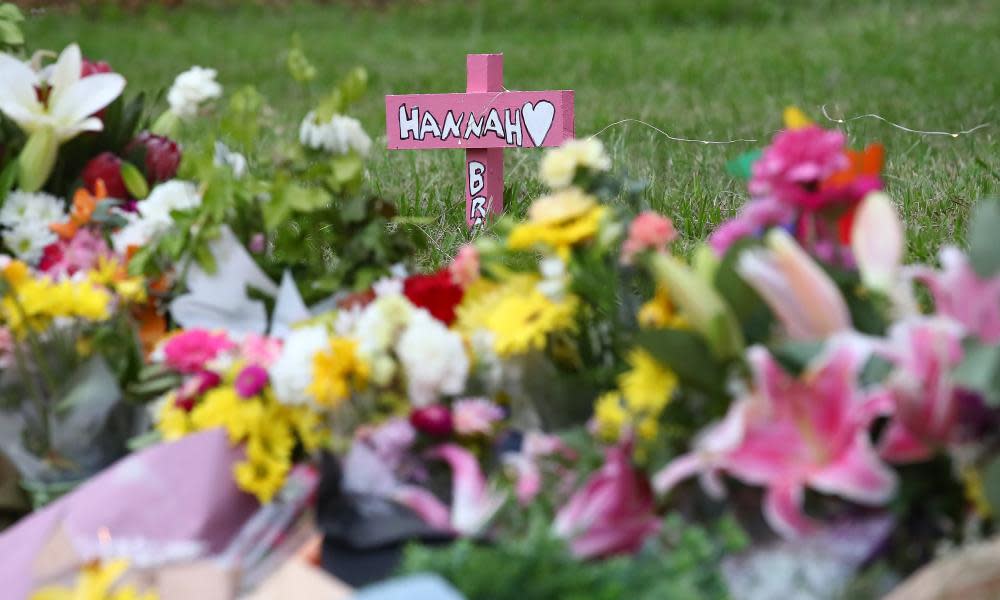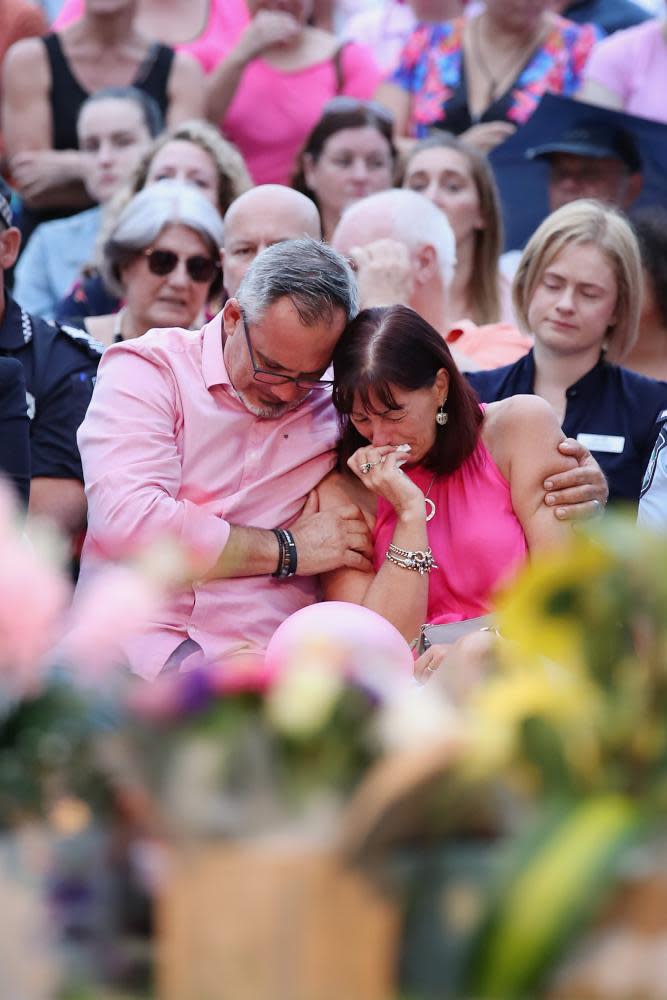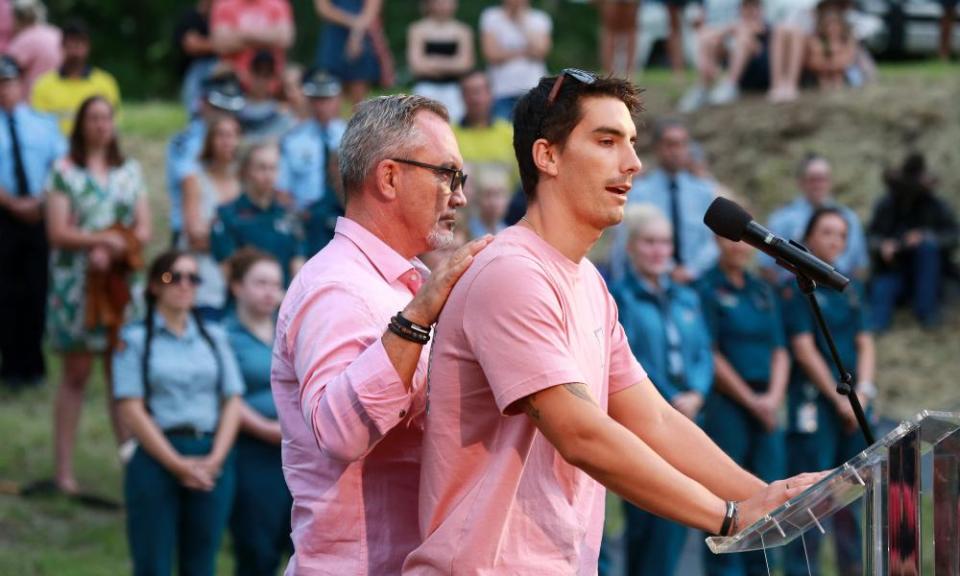Coercive control and domestic abuse: what might have saved Hannah Clarke and her children?

“I was thinking it wasn’t abuse because he never hit me.”
These are words that will stay with Suzanne Clarke. Her daughter, Hannah Clarke, who was burned to death in Brisbane last week with her three children, told her mother that she had questioned herself “for years” about whether she was in a domestic violence situation.
With Hannah’s father, Lloyd, and her brother, Nathaniel, the devastated mother told A Current Affair her daughter’s story, of the control and manipulation that preceded her ultimate fear for her physical wellbeing.
Related: Queensland police's problem with domestic violence
“This is such a tragic event,” said Nathaniel. “We want to be able to help people in a similar situation to what my sister was in, and maybe raise awareness of early signs of domestic abuse that are not easy to see. Not all domestic abuse is physical.”
And, as Lloyd added, “We didn’t see it for a long time.”
As in the terrible moment Australia learnt of 11-year-old Luke Batty, who died at the hands of his father while his mother, Rosie, looked on, the Camp Hill incident of a man throwing petrol over his three young children and his wife in their car, and then stabbing himself as they burned, brought the urgent question of how to keep women and children in domestic abuse situations safe to the front of the national conscience. Again.

Our laws have assumed for many years that people who eventually wield deadly violence are physically violent before that, and so policing has attempted to reduce homicidal violence by prosecuting lesser violence, such as physical assaults, on an incidence-by-incidence basis.
But as it has become clear, many homicides of women and children by the woman’s partner or former partner are not preceded by any physical violence – Hannah Clarke was not subjected to physical violence by her husband until he killed her and her three children Aaliyah, 6, Laianah, 4 and Trey, 3.
Related: Woman prosecutes former partner who doused her with petrol in case Queensland police refused
When they were together, Hannah’s former partner controlled microscopic details of her life. He told her what to wear. He punished her with silence. He monitored her phone. He isolated her from her family. Hannah’s family said the control presented itself in small ways, like the fact he wouldn’t allow Hannah to wear shorts or walk off the beach in her bikini.
“Little things like that, in the beginning, we just thought, ‘He’s a prude.’ In hindsight, we know there is more to it,” Suzanne said.
Yet Hannah knew she was in danger after leaving her partner in November. She took a domestic violence order against him, which he breached three times in quick succession. As he became increasingly desperate, he abducted his daughter Aaliyah and took her interstate until police recovered her. The week before she died, Hannah asked her mother what would happen to her children if he killed her.
This conscious awareness that her partner was becoming a risk to her life is what researchers call the “golden thread” of coercive control.
And it is this golden thread that is the most accurate predictor of the unleashing of deadly violence.
London researchers Andy Myhill and Katrin Hohl reported in 2016 that the dangerous patterns of coercive controlling behaviour were the best predictor of the risk of domestic homicide, better than assessing danger by physical assaults alone.
Mainland Australia has no laws that directly criminalise non-physical domestic abuse, such as psychological abuse or coercive and controlling behaviour: behaviour that makes the victim dependent on or subordinate to the perpetrator; behaviour that isolates a victim from family and friends; monitors their communications; deprives them of autonomy or decision-making power; or that frightens, humiliates, degrades or punishes them.
Australia has been arguably very slow to reform. A 1986 report by the Australian Law Reform Commission more than 30 years ago found that domestic violence victims found police to be dismissive towards complaints of domestic violence and that sanctions imposed by the courts were seen as ineffective.
American researcher Evan Stark wrote a book in 2009 that raised the critical importance of non-violent control of intimate partners via coercive control that gradually destroys the personhood of their partner.
He says offenders typically intimidate their partner via daily actions including isolating them, cyber-stalking, sexual coercion, financial abuse and emotional abuse; and micromanaging their dress, speech, activity and work.
According to Myhill and Hohl, Police need to ask about coercive control to understand the degree of entrapment of the woman. This would reveal the amount of assistance she needs to build support networks so she is able to leave safely.
Deakin University researchers Paul McGorrery and Prof Marilyn McMahon called last year for authorities to consider criminalising coercive control in Australia, following the successful introduction of laws in the UK, and especially Scotland.
The death of Hannah Clarke and her children is a shocking crime that has galvanised public sentiment towards the need to stop domestic violence murders, McMahon says.

However she says it would be a big mistake for Australian legislators to rush through poorly-drafted legislation as a knee-jerk response to appear to be “doing something”.
“We need to recognise the crisis and then we need to have a reasoned response,” she told Guardian Australia.
“If we talk to victims, they will often say the psychological abuse – the intimidation, the coercion, the controlling behaviour is the worse part – apart from the most extreme forms of physical violence.
“Controlling behaviour is often a precursor to violence and homicide. It is a very potent warning sign but controlling behaviour is also a wrong in itself and we should try to find ways to eliminate it.”
That said, McMahon believes people should not have to live in fear.
“They shouldn’t have to live subject to the control or coercion of others. If we agree on that, that is the impetus for criminalisation. The critical question then is, ‘How do we do it?’” she said.
McMahon points to Scotland’s Domestic Abuse Bill as the new gold standard, although “we haven’t yet received empirical information about how it’s working”.
McMahon says anecdotal information suggests the laws have enabled authorities to punish behaviour with significant jail time that would otherwise have been difficult to prosecute, including stopping a partner from seeking or continuing employment; inspecting a partner’s home or body for evidence of infidelity; threats to expose private photographs of a partner or ex-partner; threatening self-harm to prevent a partner leaving a relationship; threatening to harm a partner’s pets; demanding that their partner eat certain foods; or that they sleep on the floor.
Queensland and South Australia are the only states that have so far considered introducing coercive control legislation.
McMahon does not recommend that the rest of Australia should copy the 2005 Tasmanian legislation that criminalised economic abuse and financial abuse because it was poorly drafted and has been rarely used.
She believes the Scottish legislation is as good a starting point as any but warns that legislating to criminalise psychological abuse is so different from physical injury that prosecutors and police will need training in the mechanics of evidence-gathering and prosecution.
“We need to get our prosecutors on board. We have to get our police on board. We need the Council of Australian Governments – the attorneys general – to look at a model offence and then introduce it,” she said.
In Queensland, doing nothing is no longer an option, according to Women’s Legal Service CEO Angela Lynch: “Same old, same old, is clearly not enough.”
Queensland has already implemented the 140 recommendations of the Not Now: Not Ever report but still women are dying, she says.
Women’s Legal Service wrote this week to the premier, Anastasia Palaszczuk, calling for coercive control to be criminalised in Queensland and for the new laws to be embedded in a broader strategy to respond to violence against women and children and accompanied by comprehensive training for police.
Related: 'Failure in our system': after Hannah Clarke and her children's murder, experts call for action
Lynch says one positive impact of coercive control legislation would be that police would need to take a full history of violence in a relationship instead of their current incident-based approach.
Had coercive control already been a crime in Queensland, Hannah Clarke may have been asked for a complete history of her husband’s abuse of her including the threats, intimidation and sexual abuse.
“The husband could have been charged with a criminal offence. The system could have responded in a more serious away. He might have been denied bail. If he was released he might have had strict bail conditions or a tracking device,” Lynch said.
This week Queensland’s opposition leader, Deb Frecklington, called for coercive control legislation among a package of other strong measures to reduce domestic violence and intimate partner homicide.
“We owe it to Hannah Clarke and countless other people who have lost their lives, and survivors of domestic violence, to make sure we look at a suite of reforms,” she said.
In Australia, if you or someone you know is impacted by sexual assault, domestic or family violence, call 1800RESPECT on 1800 737 732 or visit 1800RESPECT.org.au
In the UK, visit the National Domestic Abuse Helpline website here or call 0808 2000 247
In the US visit the National Domestic Violence Hotline website here, or call 1-800-799-7233.


